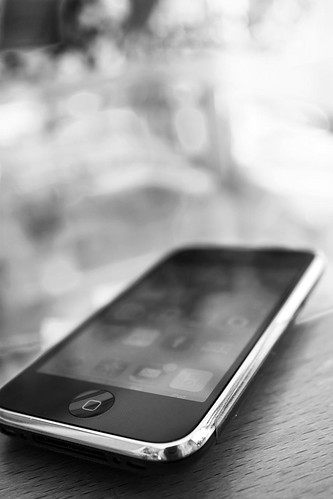Cell phones can do it all today. They can surf the internet, send a fax, handle bank account transactions, send photos, and oh yeah—they can make phone calls too. But how secure is the information that you send through your phone? Your phone may be putting your identity at risk if you are not abiding by the guidelines we have written in this article.

 by Xraijs_
by Xraijs_
The dangers of public WiFi
You might want to use your phone’s wireless internet feature instead of using your phone’s signal when you are at the local coffee shop, but this could be a bad idea. It is not very difficult at all for someone to hack into your phone if you connect to the wrong wireless network. And besides that, many recommend that if you are going to do any surfing on your phone that involves sensitive data (like your email and bank account) you should just use your phone’s encrypted signal. The signal from your wireless company is much more secure than using an open public wireless network.
Leaving your phone unattended
A stolen phone is not much good to a thief if they want to use it themselves. Once a phone is stolen the service provider makes it almost impossible for it to be used as a phone again, but that doesn’t mean that someone can’t use your phone to steal you identity. Many cell phone users put all kinds of personal information on their phones, but this is not advised. Avoid putting your passwords, medical information, link to your bank account, and automatic email updates on your phone. Yes, these things are convenient when you need to pull up your email quickly, but it also makes it convenient for someone who wants to take that information and use it against you.
Using a lock on your phone
I used to use that locking sequence all the time on my phone when I first got it. But then I got tired of entering my code every time and took it off. But after seeing a friend go through my address book on my phone when I left it on the table, I realized what a security threat it was leaving the code off like that. It only takes an extra second to enter the code, and it keeps any lazy hackers from extracting any information about your life from your cell. Some phones are using facial recognition technology for you to unlock your phone, so this option will make it more convenient to still have some security.
Getting virus protection on your phone
You might think you don’t need any software to keep viruses and malware off your phone, but this is a growing threat, especially for Android phone, thanks to the open way in which apps are added to the marketplace. But thankfully, there are plenty of apps that can help keep those pesky viruses off your phone, but read the reviews before you put it on your device.
Jon keeps up to date with identity protection services and writes Lifelock reviews to help inform consumers about how they can guard their identities.
TweetTags: cell phone, identity theft, phones, safety, security, tech, technology